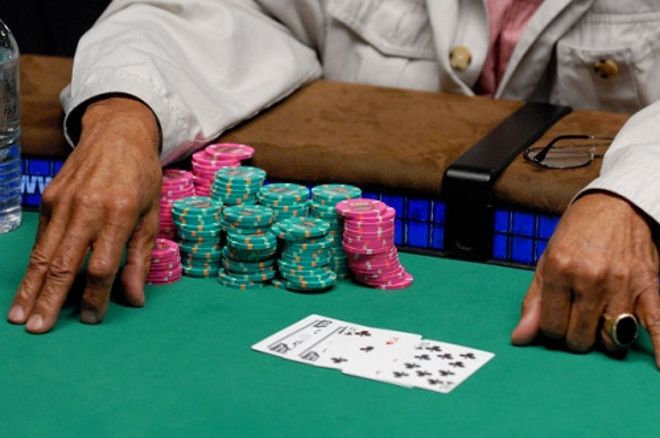7 Card Stud Strategy
How to Count Cards in 7 Card Stud
This article provides basic strategy for counting cards in seven card stud. Determining which cards are live is fairly simple. The more players dealt into the hand and remain in the hand to see. Seven Card Stud High/Low No Qualifier (Stud NoQ) is a split pot Seven Card Stud game where the best high hand splits with the best low. The high card on 3 rd street is forced to bring-in the action but afterwards action starts on the low board. As the name suggests there is no qualifier for the low hand.
Seven Card Stud is all about the cards. In order to play this game successfully you have to make sure you pay attention to every up card which will give you a pretty clear indication of how strong or weak your hand is in relation to your opponents. Counting live cards based on suits and sequence is critical if you plan on staying one step ahead of the game. You don’t necessarily have to sit at the table with a pen and paper to keep track of the live cards, but being able to recall the majority of them will definitely help. This article provides basic strategy for counting cards in seven card stud.
Determining which cards are live is fairly simple. The more players dealt into the hand and remain in the hand to see additional cards, the more live cards in play. To make counting cards easier, use your hand to compare the number of dead cards to you. Once the first betting round is complete, check the table for any of the cards that will help strengthen your hand. Suppose you have a 58T, cards that will help you would be 4,6,7,9,J,Q along with the remaining 9 cards to give you a pair or set. Quickly scan the table for any doors cards that match the cards you need and count them as dead. This includes cards by sequence or suits. If you can play for the flush you’ll need to evaluate the other players on later streets to see how strong their potential flush is compared to yours.
Counting Cards on 4th Street in Stud Poker
Once you’ve reached fourth street you can now look for cards that have the potential to increase your hand either through a straight or flush and will have a pretty good idea on what your opponent may be playing to put them on a range. By fourth street you’ll be able to discredit potential flushes if there appears to be a large number of a particular suit spread across the other players door cards. That said you should also make yourself aware of any player who has paired their door cards as they will be open to full house possibilities on later streets.
Fifth Street Stud Poker and Counting Cards
Fifth street gives you a very clear indication of what you’re up against. If a player has three suited door cards and begins to bet, it can be assumed he’s drawing to his flush or has his flush. Make sure you’ve scanned the table again for live and dead cards. Also be aware of duplicate cards and where those cards can be used for other opponents. If you notice someone drawing to an A high straight and on fifth street, three players receive a K, it’s unlikely that the player will make their hard with one card to come. Usually in scenarios such as this, one bet will force them to fold. That’s not to say you shouldn’t play with caution as there is the possibility that they made their hand on 5th street and that draw was hidden as a door card.
If your hand on 5th street is still marginal at best, play with caution when you see an opponent pair a door card and begins to play aggressively. This is usually a pretty good indicator that he’s holding either a set or full house. The same holds true when it appears your opponent has a straight. There is a possibility that he’s betting for value with his open ended, but your best strategy is to avoid situations where you get sucked in. If the majority of the cards you need to make your hand are still dead you should be folding.
An easy tip for keeping tabs on suited cards is to use the four coloured deck option when playing online poker. This feature is usually located within the top menu panel in the poker room lobby.
For some poker fans, seven card stud gets a bad rap because the rules are similar to casual card games like Spit in the Ocean and Baseball. Yes, these games are similar to 7 card stud. But they’re different enough from the way stud is played in casinos or private games to make the comparison meaningless.

The history of stud poker really tells the story of the United States; in some ways all games are a mirror of the culture that invents them, but seven card stud reflects the history of the USA like no other American game. Though Texas holdem is by far the most popular variant these days that was not the case up until the late 1970s and early 1980s, when stud was the number one variant in the United States and in most of the world. Though it has waned in popularity in recent years, stud is still available in traditional poker rooms and at Web-based casinos.
Stud Poker Betting Rounds
Since many poker rooms have been forced to turn away from the majority of the US poker market (embracing their European and Asian audiences) more stud games and tournaments have been popping up. European and Asian players are generally far more into this game than American gamblers.
7 card stud is considered a more difficult game, and while no one is saying that US card gamblers are less intelligent, it is clear that bettors who enjoy stud seem to be those that like a bigger challenge. Learning strategy for stud is more difficult, thanks in large part to the game’s greater number of betting rounds.
How To Deal 7 Card Stud
The larger number of betting rounds forces gamblers to learn patience and the psychological side of the game. More betting rounds means more chances at spotting tells. This feature also reinforces the need for good hand selection. Players who learn stud will benefit greatly from learning to read their opponents better.
Why the increase in patience and hand selection? An extra betting round in stud (compared to the more-popular Texas holdem) means more pots go head to head and fewer pots are chased by most if not all of the gamblers at the table. Learning patience means learning to wait out a good hand, and gaining the confidence required to stick to a bluff. It’s funny how the addition of a single betting round has such a drastic change on strategy. It may be that the inclusion of a fifth betting round is responsible for many holdem fans’ shyness toward stud.

Door Cards in Stud Poker
Gamblers who have only ever played Texas or Omaha holdem may be intimidated by the different appearance of a casino’s stud table. The door card is presented face up (at all times) and plays a big role in the game’s action.
It has been said that Europeans have never embraced American style football (think NFL not soccer) because of the unfamiliar shape of the ball. Most sports use a ball that is essentially a perfect sphere. The unwieldy pigskin in American football games not only looks funny, it bounces in an unpredictable and unfamiliar way. Think of stud’s door card as the NFL’s weird non-spherical ball. It may be the use of a face up door card that keeps Americans from really embracing stud on a grand scale.
The door card has a major effect on stud strategy. It is the reason why some stud players learn how to count cards. That’s because, as is the case with all game variants, the more you can figure out about your opponents’ hands, the better chance you have of keeping some of their bankroll for yourself.
The door card tells you just enough about the hand of the guy you’re going head-to-head with to make players with a keen eye for psychology really dangerous.
Combined with the knowledge of their other cards and it is really easy to work out their strategy, their goal, their approach to each hand. What’s the value of card counting in stud? Imagine you’re at a table with seven other players. You’re holding out for an Ace. A glance around the table at door cards (and whatever information you’ve stitched together about what else they may be holding) gives you an advantage non-counters don’t have.
The biggest impact of the door card in the game’s strategy comes from the effect it has on wagering. The initial bet in stud is a forced bet. The player with the lowest-value door card is forced to make a bet of a certain size depending on the rules of the game or table. After the first round the highest door card determines the bet; but the first time around the holder of the lowest card has to wager.
Surprisingly Good 7 Card Stud Hands
The three hands described below are examples of those not normally very valuable in poker; because of the way stud is played and the way other players tend to approach the game, they can be used to surprise your way to a pot.
Trips are among the best hands in the game, but they need to be played the right way. In stud, trips should be played quickly. We’re talking about aces through 10s. The reason – most of your opponents will think you’ve got a high pair and they’ll bite. Low trips aren’t necessarily bad (“low trips” here means 9s through 2s) but they should be played slowly until fifth street. This tactic is best used against newbies or players who lack confidence and experience.
Many players (especially those unfamiliar with games other than holdem) don’t realize that high pairs can be great hands in stud games. If you’ve got a pair of face cards and you play your hand quickly, you are in a pretty good position, especially compared to the value of the same hands in other variants.
A hand made up of any three cards toward a straight flush (for example, suited 5, 7, and 9) should be folded if most of the flush cards are dead. But if that’s not the case, playing this hand slow puts you in the catbird seat more often than not – as long as you check/fold once it is clear you aren’t getting your cards.
Texas Holdem Players: Give 7 Card Stud a Chance
More poker players should learn to play this game. Players who focus exclusively on Texas holdem are not just holding themselves back from improving their skills, they’re missing out on a lot of fun. Giving a game like stud a try will increase your understanding of game strategy and give you a leg up against other players who focus exclusively on one game.
How To Play 7 Card Stud Strategy
Gamblers can benefit from stud because the game involves more betting rounds and requires you to learn how to use your position and bluffing skills in a way that the Texas holdem variant doesn’t. The “door card” feature of stud games that forces players into difficult betting situations will only make you a better poker player; many 7 card fans end up learning the basics of card counting, a skill that will serve poker players well on almost any game held in a poker room or at your buddy’s house on a Friday night.
How Play 7 Card Stud
See also: